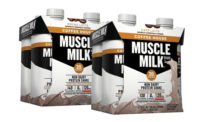We’ve all heard the mantra: “Eat your protein to build a strong body” or “Milk, it does a body good.” When one thinks of protein, perhaps a thick steak or chicken comes to mind along with eggs, salmon, and tofu. Yet, protein, calcium, and vitamin D also are found in ample amounts in milk, cheese, yogurt, and a whole host of healthy, good-for-you dairy products.
Among the protein-rich dairy foods consumers are enjoying are cheese, at nearly 23 grams per serving; cottage cheese, at 11.1 grams per serving; and low-fat plain yogurt, 9 grams in a 6-ounce container. Whole cow’s milk contains 8 grams of protein in an 8-ounce glass, while sheep’s milk has the highest protein with 14.7 grams per 8-ounce serving, according to the U.S. Department of Agriculture (USDA).
Casein and whey protein are the major proteins in bovine milk, with casein constituting 80% of the total protein and whey protein comprising about 20%, the USDA adds.
Protein-rich products are solidly at the top of consumer health and nutrition trends. According to the IFIC 2023 Food & Health Survey, “high protein” claims snagged the No. 1 spot among U.S. consumers’ preferred eating patterns.
Although protein fortification is not a new trend, consumers are demanding “high protein” products like never before, says Joe O’Neill, vice president of sales and business development at A&B Ingredients.
“The demand for high-protein dairy products is growing, driven by consumer interest in options like cheese, cottage cheese, and yogurt,” O’Neill explains. “Despite a 5.1% decrease in dairy sales in 2023, the dairy segment remains the largest sales category in U.S. grocery stores, exceeding $78 billion. Cottage cheese sales demonstrated significant potential, with a 12% increase year over year.” (See Market Trends report in this issue).
Market research analysts highlight that the protein ingredients market within dairy foods and beverages is increasing at a decent clip — from $42 billion globally in 2022 at a nearly 8% compound annual growth rate (CAGR) to $90 billion by 2032, according to Global Market Insights. Additionally, the value of animal/dairy proteins is projected at nearly $91 billion by 2032, while food and beverage applications are expected to rise to $47 billion.
While sustainability and plant-based ingredients were still niche a few years ago, today they are at the forefront of many business strategies. By 2026 the plant-based protein market will be valued at $15.6 billion, growing at a CAGR of 7.2%, states MarketsandMarkets.
Protein ingredients produced from both plant and animal sources have emerged as “essential ingredients” in the food and beverage industries. Consumer demand for healthy and nutritious food options, particularly plant-based alternatives, will drive market growth, according to Global Market Insights.
Derived from sources like soy, peas, rice, chicory root, beets, and various legumes, plant proteins are rising in popularity due to lifestyle preferences for consumers who follow vegan (no meat, dairy or eggs) and vegetarian (no meat, fish or animal by-products like rennet), and associations with improved cardiovascular health.
Parsippany, N.J.-based BENEO notes that protein enriched smoothies or vegan drinks are part of consumers’ healthy lifestyles. Though highly desirable, protein-enriched applications are not always easy to formulate and no one wants to see a protein residue at the bottom of a bottle, states the company known for producing functional ingredients from natural sources.
Yet, due to the high solubility of its faba bean protein, the BeneoPro FB, there is no sediment or sandy mouthfeel in the end product, the company states. Instead, the company says its faba bean protein concentrate provides a homogenous and stable drink with a pleasant texture and good taste. The plant-based concentrate also has good emulsifying and foaming properties, a great amino acid profile, complementary to cereal, and is ideal for vegan cappuccino-style drinks or dairy-free coffee creamers.
Another sustainably sourced protein contributing to growth in the plant-based space are pea proteins. Predicted to generate $2.1 billion in sales in the United States in 2024, pea proteins are projected to grow at a CAGR of 12% to $3.7 billion from 2024 to 2029, MarketsandMarkets states.
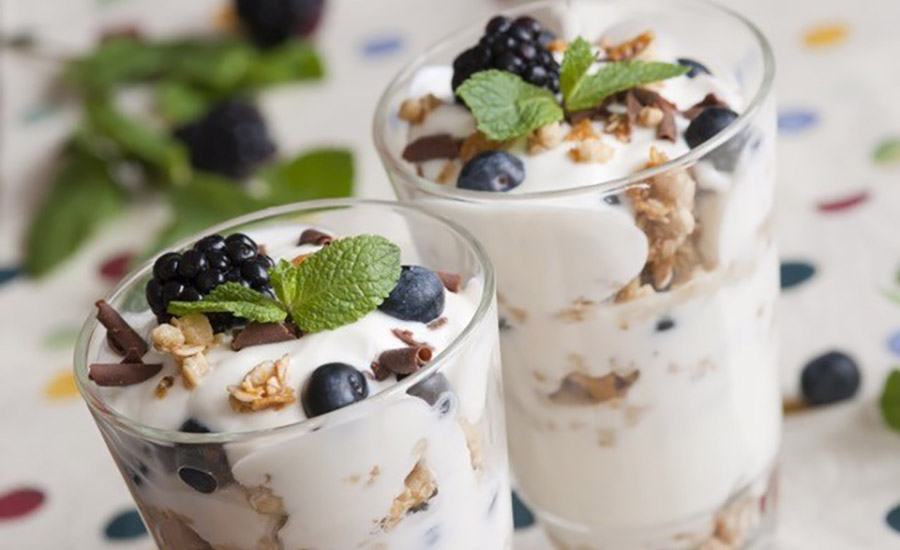
Pea protein’s rise in popularity is attributed to its exceptional nutritional profile, which is rich in essential amino acids like lysine that is often lacking in other plant-based sources. Since it excludes soy and dairy, pea protein is allergen-free and emits fewer greenhouse gases than animal-based proteins because it is sustainably sourced. This aligns with eco-conscious consumer preferences, MarketsandMarkets reports.
“The versatility of pea protein appeals to food manufacturers, seamlessly integrating into various products like plant-based meats, dairy alternatives, snacks, and supplements, without compromising taste or texture,” MarketsandMarkets states.
Fairfield, N.J.-based A&B Ingredients sources ingredients from nature that are designed to be functional and clean label. Its Pisane pea proteins are of high purity and contain all the essential amino acids in significant amounts, according to O’Neill. These versatile, functional ingredients boast protein content of 86%, improve mouthfeel and taste, and provide superb emulsification properties in dairy beverages, powder blends, and non-dairy products, he adds.
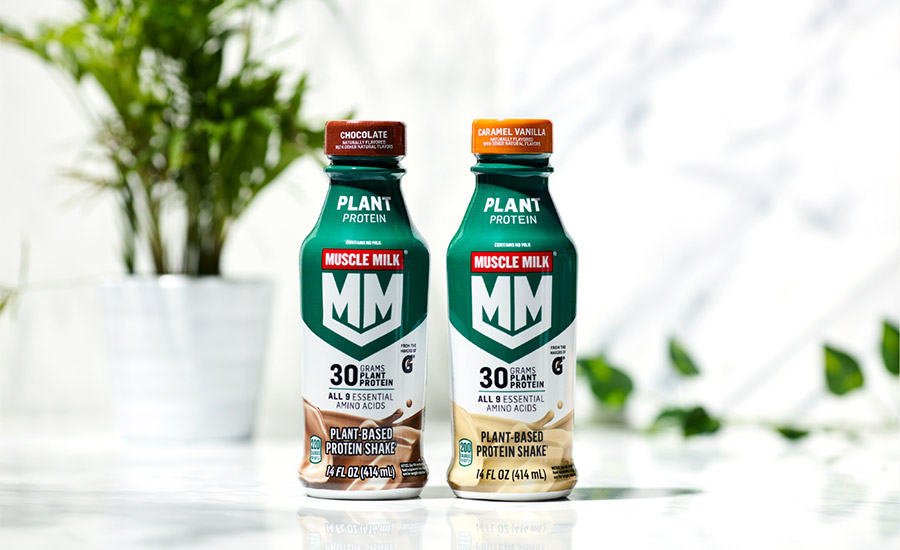
“We offer a range of pea protein isolates that are non-GMO, allergen-free, and all-natural ingredients. Pea proteins are recognized for their various nutritional and functional benefits,” O’Neill says. “…In addition to protein fortification, pea proteins are readily soluble and can enhance the creamy mouthfeel in ready-to-drink beverages and coffee creamers without adding fat.”
Shake it off with dairy and non-dairy products
In its March report on “Dairy Cultures Market by End User (Cheese, Yogurt, Kefir, Others), and Fermentation Type (Lactic Acid, Yeast-Lactic Acid, Fungus-Lactic Acid),” Portland, Ore.-based Allied Market Research highlights that the global dairy culture industry generated $883.2 million in 2022 and is anticipated to generate $1.47 billion by 2032, achieving a CAGR of 5.8 % from 2023 to 2032.
Greek yogurt is second only to salmon in the amount of protein delivered, while oats have a unique protein composition along with high protein content of 11% to 15%.
O’Neill cites several brands making strides in the functional dairy category. Chobani has been leading the way with its high-protein Greek yogurt products. Its latest innovation is a lactose-free drinkable yogurt with 20 grams of protein, 3 grams of fiber, and no added sugars.
Nestlé Health Science offers dairy-based nutritional products under the Boost brand. These balanced nutritional drinks provide up to 20 grams of protein per serving, as well as vitamins and minerals, making them suitable for consumers looking to boost their protein intake.
Sports nutrition companies are trying to pack as much protein as possible per serving. “Some companies are trying to formulate drinkable yogurts fortified with protein to deliver 40 grams protein per 8-ounce serving,” notes Anand Rao, Ph.D., vice president of ingredients innovation at Agropur, Appleton, Wis.
In April, Muscle Milk Plant Protein, the first plant-based line from Muscle Milk, hit store shelves nationwide. The new line of plant-based protein shakes is powered by 25 to 30 grams of protein per serving and comes in two creamy flavors: Chocolate and Caramel Vanilla. Muscle Milk Plant Protein, a brand of CytoSport Inc., retails for $4.99 for a single-serve 11-ounce bottle, while a four-pack is $10.99.
Muscle Milk also served up a marketing campaign, “Strength For It All,” starring WNBA’s Candace Parker and baseball star Julio Rodriguez.
A dairy product that will never go out of style is protein-rich cow’s milk, which contains both A1 and A2 beta-casein proteins. And for consumers who may have trouble digesting dairy, new milks, like a2 milk, which contains only A2 beta-casein and is made from 100% real cows’ milk from grain and grass-fed cows, may be easier to digest, potentially reducing symptoms associated with lactose intolerance and milk sensitivities.
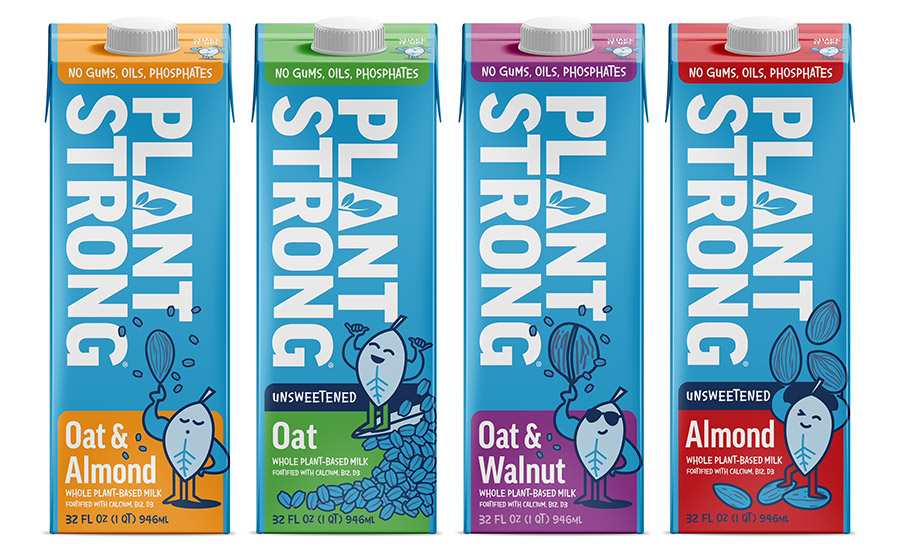
With protein a top functional ingredient, Washington, Mo.-based Osage Food Products developed a DairyPro line of dairy products that features whey proteins, milk proteins, casein and caseinates, colostrum, and whey-based crisps.
“These proteins combined with our flavors and SolvSweet sweeteners can help make any product function and taste incredible,” says Matt Peacock, Osage’s vice president of business development. “Dairy products contain some of the best tasting proteins on the market and their inclusion will continue to grow in product launches. They do not have the off flavors and odors that some plant-based proteins have. Finding the right dairy protein for new product development is the first step and we’re happy to help.”
Overcoming formulation challenges with plant proteins
Non-dairy, non-GMO plant-based products also are capturing consumer’s attention. Yet, Glanbia Nutritionals’ Niki Kennedy, director of Insights & Content, notes that plant proteins are “incomplete and lacking in certain essential amino acids like leucine” that are available in “real” dairy products like milk and ice cream.
“In terms of taste and texture, plant proteins are much harder for formulators to work with to overcome both ‘grassy’ notes and their lack of the typical ‘creamy’ texture of a dairy-based product,” Kennedy adds. “A blend of dairy protein with a plant protein source can compensate and create a better amino acid profile while providing the missing attributes in taste and texture.
“Glanbia Nutritionals has decades of experience in formulating a wide range of high-protein ingredients that deliver appealing textures in application and offer a great taste experience as well in a range of food, beverage, and supplement applications,” she adds.
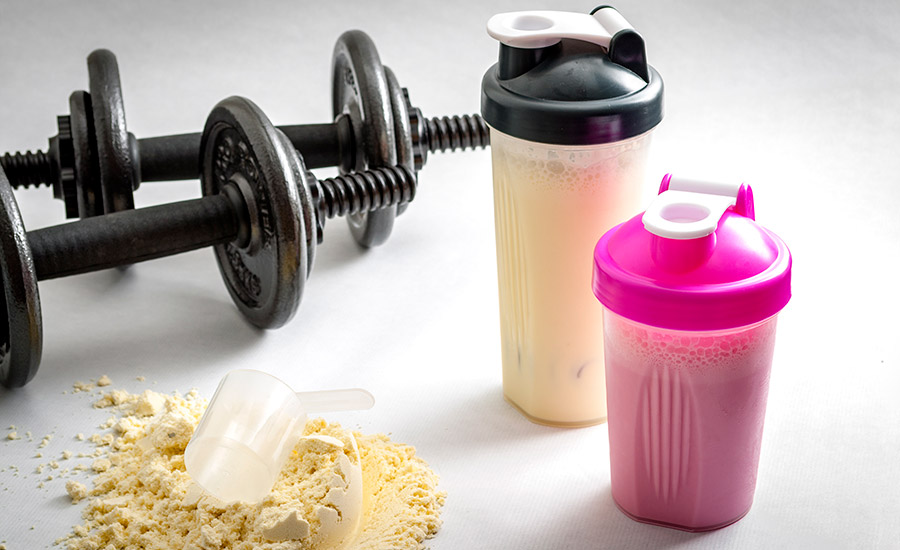
A&B Ingredients’ O’Neill agrees that protein blends offer the ideal solution to overcoming grassy off-notes. “Hybrid protein products have been called the ‘breakthrough’ in the alternative protein industry,” O’Neill says. “Pea protein isolates offer functional benefits and can enhance the nutritional profile of dairy products, benefiting manufacturers seeking product innovation.”
Despite their inherent functionality, most plant proteins tend to be deficient in one or two essential amino acids, negatively impacting their nutritional value, Agropur’s Rao says. “Unlike dairy proteins that are naturally highly soluble and highly digestible, plant-based proteins were designed by nature to be insoluble in seeds and grains. Even when purified, the plant proteins tend to pose challenges in formulating because of their functionality.”
Novel product applications and future growth
From now until 2036, the pace of protein ingredient growth and ongoing research and development operations to explore various novel product applications will flourish with innovation, functionality, and clean label at the forefront, Kennedy affirms.
In April, PLANTSTRONG launched a clean-label, fortified plant-based milk, which is available in more than 500 Whole Foods Market store in 45 states and 387 cities, the Austin, Texas-based company says.
Available in four varieties, Unsweetened Almond and Unsweetened Oat are joined by Oat & Almond and a never-before-seen blend: Oat & Walnut. All four come in 32-ounce containers, require no refrigeration until opened, and are available in the shelf-stable milk section of the stores.
PLANTSTRONG was founded in 2019 by Rip Esselstyn, a Texas firefighter who is a New York Times best-selling author and health advocate.
“Look at the ingredient labels of the most popular plant-based milks and you'll see they are full of gums, oils, enzymes, emulsifiers, and refined sugar,” states Esselstyn. “PLANTSTRONG provides a long overdue, clean-label option in the non-dairy milk category, one that is packed with nutrition and tastes great.”
Esselstyn notes that the milks are produced using a patented process made from whole grains, whole nuts, and whole fruit sweetened with dates. “PLANTSTRONG milks put the ‘plant’ back in plant-based. “Our patented process blends every part of the plant. This means more of the good stuff, better flavor, and a lot less waste,” he says.
Yet, when it comes to protein as a pivotal ingredient, ingredient suppliers are reimagining the status quo in dairy and non-dairy products while not losing sight of functionality and offering consumers the biggest nutritional bang for their buck.
Innovative products and supplements that support healthy aging are in demand. L-Nutra unveiled a patent-pending protein designed to support healthy aging: L-Protein. This first-of-its-kind protein formula was developed by the Los Angeles-based nutrition company to support muscle function and healthspan. L-Protein, tested by leading longevity researchers, boasts 25 grams of specifically designed plant-based proteins and amino acids, 21 vitamins and minerals obtained from 11 fruit and vegetable extracts, and extra virgin olive oil.
“We are also starting to see consumers seeking out functional protein products that also carry an immunity or brain health claim,” says Osage’s Peacock. “Functional dairy ingredients such as lactoferrin and milkfat phospholipids are gaining traction in new product development. Functional ingredients are being developed to improve the taste, texture, mouthfeel, and stability across a wide range of consumer products.
“This research continues to create new protein functionality for novel applications into food products,” he concludes. “We think there will be additional work done with some of the individual proteins found in milk, i.e., lactoferrin, to find how these proteins can help certain immune or muscle synthesis functions, as well as new technology to widen the processing range that dairy products can go into food applications.”





.jpg?height=200&t=1716230191&width=200)
